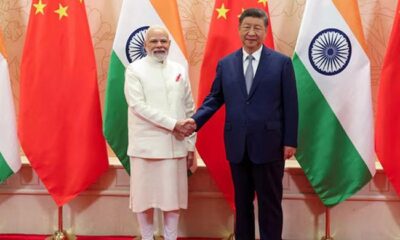Business
Shift in FDI Needed to Break Reliance on Energy Sector – SUCH TV

The Pakistan Industrial and Traders Association Front (PIAF) has cautioned that Pakistan’s overdependence on energy-focused foreign investment is holding back broader economic growth, calling on policymakers to expand investment opportunities in mining, manufacturing, IT, and other underdeveloped sectors.
PIAF Patron-in-Chief Mian Sohail Nisar said that heavy concentration of foreign capital in a single sector is concerning.
“Foreign investors continue to channel funds primarily into energy, but Pakistan has far greater potential in mining, information technology, and value-added manufacturing,” he said.
Over the past 10 years, FDI into Pakistan has ranged from $2 billion to $3 billion annually, with roughly 35% directed to the power sector, underscoring the need for diversification.
According to the State Bank of Pakistan (SBP), Pakistan attracted total foreign direct investment (FDI) of $2.46 billion in fiscal year 2024-25, a year-on-year increase of around 5%.
China remained the leading investor with $1.23 billion, nearly double its investment from the previous year, registering a 91% jump.
Other significant contributions came from Hong Kong with $470 million, the United Arab Emirates with $283 million, Switzerland with $203 million, and the United Kingdom with $202 million.
Sector-wise, the power sector continued to dominate inflows, receiving $1.17 billion, much of it in hydel projects, while financial services attracted $702.2 million.
Oil and gas exploration, electronics, IT, food, petroleum refining, and textiles were among other sectors that managed to secure a smaller share of investment.
Representatives of the business community noted that while the overall numbers for FY25 show an improvement, the gains remain fragile and heavily skewed.
They emphasised that credible projects, transparent regulations, and genuine economic opportunities are necessary to convert investor interest into broader inflows.
Without reforms, they warned, Pakistan risks remaining stuck in a narrow energy-focused pattern of investment.
A Lahore-based industrialist, Ashraf Javed, pointed out that countries in the region are moving ahead quickly.
“India and Bangladesh are attracting billions across diversified sectors like IT, manufacturing, and e-commerce, while we continue to depend on power projects,” he said. “We need stable policies, simplified regulations, and consistent tax frameworks if we want to bring long-term investors to other industries.”
Mining has emerged as one of the most promising areas for Pakistan, given the substantial reserves of copper, gold, coal, and rare earth minerals in provinces like Balochistan and Khyber-Pakhtunkhwa.
Several foreign companies, including those from the United States, have shown interest in this sector.
However, business leaders argue that without practical steps such as modernising mining laws, ensuring security for investors, and cutting red tape, interest will not translate into commitments.
Independent economists have also voiced similar concerns. Syed Afaraz Ahmad, an analyst, observed that Pakistan’s reliance on debt-driven growth makes diversified FDI more important than ever.
“Energy-related investment may keep the lights on, but it does not generate large-scale employment or strong export earnings.
Mining, technology, and manufacturing are the sectors that can change the economic outlook,” he said.
The business community stressed that Pakistan’s geographic position at the crossroads of South and Central Asia gives it a natural advantage for becoming a regional investment hub.
But they warned that without deregulation, predictability in policy, and efforts to improve ease of doing business, foreign capital will continue to bypass the country.
“The potential is there; however, the challenge is whether Pakistan can create the conditions that convince investors to move beyond energy and bring real value to the economy,” said Javed.
Business
Revised Vs Belated ITR: What To Do If Your Tax Refund Is On Hold

Last Updated:
Taxpayers facing refund holds due to mismatches must act before December 31.

Knowing revised and belated ITRs can help avoid penalties. (representative image)
The Income Tax Department has recently sent messages and emails to many taxpayers saying their refunds are on hold. The reason given is a mismatch in the income tax return (ITR) details. In these alerts, taxpayers have been asked to take action before December 31, this year, to fix the issue.
This has caused confusion, especially among those who believed they had filed their returns correctly. The department has also stepped up checks on cases where it feels excess refunds may have been claimed. As a result, many taxpayers are now unsure about the right way to respond.
In its email, the department reportedly stated, “As the time limit for filing of revised ITR for A.Y. 2025-26 will expire on 31 December 2025, you are requested to avail this opportunity to file Revised Return within the due date if so required. Alternatively, you may file an updated return w.e.f. 1 January 2026, however, subject to an additional tax liability.”
With the deadline nearing, it is important to understand the options available after the original ITR due date has passed.
What Is A Revised ITR?
A revised ITR allows taxpayers to fix mistakes made in the original return. These errors could include missing income details, wrong deductions, calculation errors, or choosing the wrong ITR form. Under Section 139(5) of the Income Tax Act, 1961, taxpayers can submit a revised return to correct such issues.
A revised ITR can also be filed if the refund amount needs to be increased or reduced based on corrected information.
What Is A Belated ITR?
A belated ITR is filed when a taxpayer misses the original filing deadline. As per Section 139(1) of the Income Tax Act, this return can be submitted until December 31 of the assessment year. However, filing late usually means paying a penalty.
Taxpayers who miss the deadline are advised to file a belated return instead of not filing at all, as non-filing can lead to further trouble.
Why File A Revised ITR?
A revised return is useful when the original ITR has errors. These may include underreported or overstated income, wrong deductions, incorrect refund claims, or other filing mistakes.
As quoted by Livemint, CA, Shefali Mundra, tax expert at ClearTax, says, “There is no penalty for filing a revised return within the prescribed timeframe.”
Revised ITR vs Belated ITR Explained
“A revised return is filed to correct errors or omissions in a previously filed return (either original or belated). It can be filed before 31 December of the relevant assessment year or before the department completes the assessment. The revised return is linked to the original filing, and the taxpayer can make corrections without any penalties, apart from paying any additional taxes and interest,” CA Mundra told Livemint.
She added that a belated ITR is treated differently.
“A belated return is filed after the original due date for submitting the return, which is typically 31 July for individual taxpayers. A belated return is still considered an original return, and it is subject to a late filing fee under Section 234F (up to Rs 5,000, depending on the income) and interest on unpaid tax. Additionally, certain benefits, such as carrying forward losses, may not be available when filing a belated return,” CA Mundra also stated.
Delhi, India, India
December 27, 2025, 10:31 IST
Read More
Business
Critical Illness Claim Rejected? Here’s How You Can Fight Back

Last Updated:
A rejected critical illness claim may not be the final word if the policy clearly covers the condition.

Policyholders can successfully challenge unfair decisions.(Representative Image)
A policyholder recently faced trouble after his/her spouse was diagnosed with a serious brain-related illness. The condition was identified as bacterial meningitis with encephalitis. Believing the illness was covered, the family filed a critical illness claim with their insurer.
However, the insurance company turned down the request. The reason given was that the illness did not fall under the list of covered conditions. This left the family confused and unsure about the next step, especially at a time when medical stress and costs were already high.
Why A Rejected Claim May Still Be Valid
A claim rejection does not always mean the insurer is right. The first step is to read the policy document carefully. Most critical illness plans clearly list the illnesses they cover. In many policies, bacterial meningitis is included, but only if certain medical conditions are met.
In a similar case, a close review of the policy showed that the illness was listed among 32 covered conditions. The medical records also clearly confirmed the diagnosis and seriousness of the disease. When both the policy terms and medical proof match, the rejection can be questioned.
How To Raise The Issue With The Insurer
The next step is to approach the insurer’s grievance team. This means sending a clear written request that explains why the claim should be accepted. It is important to point out the exact policy clauses and attach all medical reports.
In the case mentioned, the policyholder shared hospital records, diagnosis details, and proof of treatment. Despite this, the insurer stuck to its earlier decision and did not provide any new explanation. This is when many people give up, but there is still another option available.
When The Insurance Ombudsman Can Help
If the insurer does not resolve the issue, the policyholder can approach the insurance ombudsman. Filing a complaint here does not cost anything. The ombudsman reviews both the policy terms and the medical evidence.
During the hearing in this case, the policyholder submitted hospital documents and a doctor’s certificate. The records confirmed that the patient had a lasting brain-related problem for over six weeks, which is an important requirement in many critical illness policies. The insurer failed to provide proof to challenge these findings.
What This Case Teaches Policyholders
After reviewing all details, the ombudsman ruled in favour of the policyholder and asked the insurer to pay the claim amount to the nominee. This shows that unfair claim rejections can be overturned if the policy terms are clear and the documents are in order.
It is always wise to read your policy closely, keep complete medical records, and use the grievance and ombudsman process when needed. Many rejected claims can be resolved because the facts and the policy are on the customer’s side.
December 27, 2025, 09:33 IST
Read More
Business
India’s Forex Reserves Surge $4.36 Billion To $693 Billion, Gold Holding Rises $2.6 Billion

Last Updated:
India’s Latest Forex Reserves: The value of the gold reserves jumps $2.623 billion to $110.365 billion during the week ended December 19.
India’s Latest Forex Reserves.
India’s foreign exchange (forex) reserves surged $4.368 billion to $693.318 billion during the week ended December 19, according to the latest data from the Reserve Bank of India (RBI). The value of the gold reserves jumped $2.623 billion to $110.365 billion during the week.
The overall kitty had increased by $1.689 billion to $688.949 billion in the previous week.
For the week ended December 19, foreign currency assets, a major component of the reserves, increased by $1.641 billion to $559.428 billion, according to the Reserve Bank of India’s latest ‘Weekly Statistical Supplement’ data.
Expressed in dollar terms, the foreign currency assets include the effects of appreciation or depreciation of non-US units, such as the euro, pound, and yen, held in the foreign exchange reserves.
The special drawing rights (SDRs) were up by $8 million to $18.744 billion.
India’s reserve position with the IMF was up by $95 million to $4.782 billion in the week, according to the RBI data.
The price of the safe-haven asset gold has been on a sharp uptrend over recent months, perhaps amid heightened global uncertainties and robust investment demand.
After the last monetary policy review meeting, the RBI had said that the country’s foreign exchange reserves were sufficient to cover more than 11 months of merchandise imports. Overall, India’s external sector remains resilient, and the RBI is confident it can comfortably meet external financing requirements.
In 2023, India added around $58 billion to its foreign exchange reserves, contrasting with a cumulative decline of $71 billion in 2022. In 2024, reserves rose by just over $20 billion. So far in 2025, the forex kitty has increased by about $47-48 billion, according to data.
Foreign exchange reserves, or FX reserves, are assets held by a nation’s central bank or monetary authority, primarily in reserve currencies such as the US dollar, with smaller portions in the Euro, Japanese Yen, and Pound Sterling.
December 27, 2025, 08:17 IST
Read More
-

 Fashion1 week ago
Fashion1 week agoIndonesia’s thrift surge fuels waste and textile industry woes
-

 Sports1 week ago
Sports1 week agoPKF summons meeting after Pakistani player represents India in kabaddi tournament
-

 Entertainment1 week ago
Entertainment1 week agoIndia streamlines visa rules in boost for Chinese professionals
-

 Sports1 week ago
Sports1 week agoUWCL grades for all 18 teams: Leuven get A+; Barça an A-, PSG fail
-
Sports7 days ago
Alabama turned Oklahoma’s College Football Playoff dream into a nightmare
-

 Entertainment1 week ago
Entertainment1 week agoRadiation fears rise after cracks found in $2 billion Chernobyl shield
-

 Entertainment7 days ago
Entertainment7 days agoRare look inside the secret LEGO Museum reveals the system behind a toy giant’s remarkable longevity
-

 Business7 days ago
Business7 days agoGold prices in Pakistan Today – December 20, 2025 | The Express Tribune














